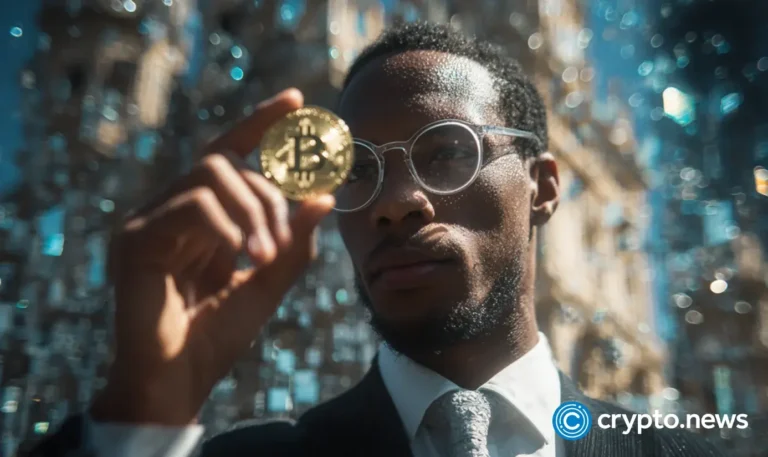Disclosure: The views and opinions expressed here belong solely to the author and do not represent the views and opinions of crypto.news’ editorial.
Have you ever wondered, while walking down city streets, why ancient estates and houses often appear so majestic and endure for centuries, while many modern homes are built to last only around 100 years? The reason lies in how their creators viewed time. They didn’t just make for themselves or their families — they built for generations to come.
Summary
- Our perception of time has been shaped by money itself. As fiat currencies steadily lose value, saving feels pointless — so we spend now, plan less, and treat the future as uncertain and disposable.
- This shift erodes the foundations of meaning. When nothing feels stable — not money, not jobs, not relationships — people stop building for the future, stop having children, and start living entirely in the now.
- Bitcoin offers a radical alternative. By reintroducing scarcity and the ability to store value over time, it invites us to slow down, think further ahead, and believe again in the possibility of permanence.
- It’s not a cure-all, but it could be the beginning of a cultural reset — one that helps us restore trust in the future, rebuild commitment, and maybe even believe that love, legacy, and family are worth investing in again.
They saw themselves as custodians of a future they wouldn’t live to see. They honored the past, and they cared deeply about the future. For instance, a lease in the Middle Ages was an agreement that could last forever.
When you perceive time across generations, you invest in the future, build to endure, and care for what has been entrusted to you. You’re more likely to cultivate patience today — an attitude that research shows can be passed down — trusting it will shape choices that preserve value into tomorrow. Patience, in turn, is closely tied to behaviors like saving, investing, and planning—actions that all depend on believing the future is real and worth preparing for.
Yet over the last half-century, personal saving rates have been in steady decline. In the United States, for instance, the average personal saving rate in the 1970s hovered around 10–12%, but by the 2020s, it had dropped to under 6%, and in some recent years, even lower.
What’s changed? Beh, money has changed. Traditional savings accounts, for example, have struggled to preserve value — real interest rates have often been negative, quietly shrinking cash over time. As money loses its role as a store of value, our time preferences shift: we choose to spend and enjoy today rather than wait for a greater reward tomorrow. This baseline behavior, combined with an increasingly consumerist and individualistic culture, has severed our connection to time — and, shocking or not, to our capacity for long-term thinking.
Hard money and store of value
For most of human history, money was hard. Rai stones, gold, and silver were all difficult to obtain — scarce by nature, and impossible to create on a whim. This scarcity wasn’t just economic — it shaped how people behave. It reinforced low time preference: the willingness to delay gratification in favor of future rewards, as opposed to high time preference, which favors immediate consumption and short-term gain.
If your savings had held their value, you would have thought differently — more long-term, more cautiously, more deliberately. And this wasn’t just an individual mindset; it became a social one. Families made sacrifices for future generations because they believed those sacrifices would compound into something meaningful.
Then came fiat — money without effort, without limits, and without time.
Inflation and the death of delay
The end of the gold standard wasn’t just a monetary event — it was a cultural rupture. When central banks untethered money from scarcity, they didn’t just inject liquidity. They injected entropy into our lives.
Inflation became normal. Saving felt pointless. You needed to spend now, consume now, and enjoy now, because your money would be worth less later. Financial planning turned into gambling. Stability gave way to hustle.
And slowly, something began to change in the way we related — not just to money, but to each other.
Commitment started to feel like a bad trade. Why tie yourself down when the future is so volatile? Why raise children in a world where you’re not even sure your rent will be stable next year? Why sacrifice for someone else’s tomorrow, when even your own feels uncertain?
Time, perception, and the future
Don’t misunderstand me. Humanity has always been uncertain about the future. That is not news. In different forms, every society across time and space has tried to anticipate the future. For instance, in ancient Rome, the College of Augurs (Collegium Augurum) — tasked with interpreting the will of the gods by observing signs (auspices), especially from birds — was central to major decisions in politics, war, and public life.
We still don’t know what’s coming — and we likely never will. But the main difference between now and then is the depth of the future we care about.
Today, we are more interested in the next quarter, next week, next hour. Our tools are sharper, but our vision is shorter. We still obsess over the future — but no longer take responsibility for it. We forecast, but we no longer prepare.
We used to care about the future the way we care about the past — intimately, respectfully, generationally. Now, we care about now.
A society addicted to now
We live in the age of the swipe, the like, and the next-day delivery. The way we treat money — endlessly printable, rapidly spent — has infected how we treat time, possessions, and even relationships.
In this environment, speculation, quick returns, and fast rewards aren’t just tolerated — they’re normalized. When the future feels uncertain and money bleeds value, people stop planning and start gambling. From iGaming to meme stocks and crypto pumps, the chase for short-term, high returns has replaced the patient work of building.
When your money is unstable, your timeline shrinks. The long view collapses under the pressure of surviving the short term. Everything becomes replaceable. Nothing feels permanent. Not relationships, not jobs, not beliefs. When time is unanchored and money evaporates, so do commitments.
I remember this vividly from my time as a Sales Manager at a 5,000-person corporation. We were reviewing our 24-month revenue targets when someone said, almost offhandedly: “It looks good — and in two years, who knows where we’ll be.”
It wasn’t meant to be cynical — it was just how people thought. Even in large, well-structured institutions, the future had become too unstable to take seriously. And when people only pretend to think long-term — without really believing in the future — then everything else in life starts to feel like an act too. That mindset doesn’t just affect individuals; it rewires entire cultures.
When our commitment to the future erodes, so does the framework we use to build our lives. We stop trusting pensions, stop planning careers, and start optimizing for flexibility instead of roots. A culture that doesn’t trust tomorrow won’t invest in it — whether through savings, community, or family.
Of course, some argue that this shift toward flexibility and individualism represents progress — not loss. They see freedom from long-term commitments as a form of empowerment, not decline.
However, children — once the ultimate long-term investment — now seem like liabilities. They cost too much. They restrict freedom. They’re incompatible with a life lived in economic panic and social flux.
So we defer. We won’t commit. We postpone. We freeze our eggs. We scroll TikTok. We chase yield. And somewhere in that endless present, we forget how to make a future.
Bitcoin and the return of meaning
But what if money could be hard again?
What if you had a place to store value that didn’t erode? What if there were no central authority to devalue your effort with the push of a button? What if time could feel real again — stable, scarce, and worth planning for?
Bitcoin (BTC) seems to propose exactly that. It’s not just digital gold. It might be a philosophical shift. It suggests: maybe there is such a thing as absolute scarcity. Maybe there is a future that deserves patience. Maybe rewards come not from speculation, but from consistency.
People often laugh when Bitcoiners discuss “time preference.” But it’s more than a meme — it could be a mindset. If your wealth can compound securely, you might be able to imagine tomorrow. And if tomorrow starts to feel real again, perhaps you start acting like it. You save. You build. You commit. Maybe… you even have children.
Bitcoin won’t fix everything. It won’t give you a baby or a mortgage or a loyal partner. But it might reintroduce the conditions under which those things feel sane again.
It might restore the invisible contract between generations. It might remind us that permanence is possible — and beautiful. That love can outlast a season. That value can last longer than a paycheck.
And in doing so, Bitcoin might do something strange, old, and deeply human. It might make us have children again.




